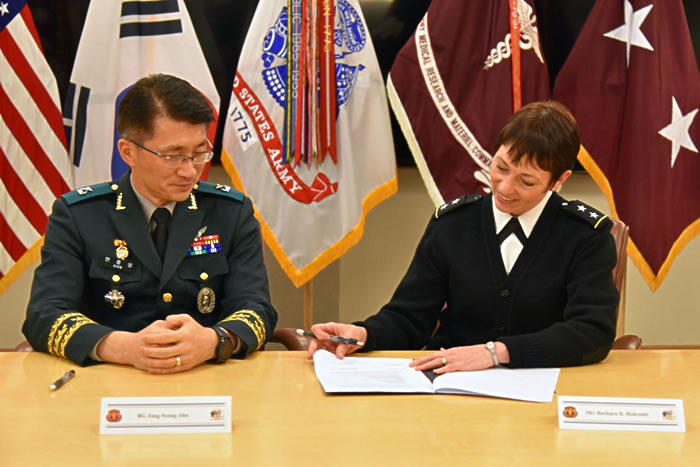United States and South Korea Collaborate on Military Medicine

The U.S. Army Medical Research and Materiel Command hosted the 48th Annual Technological Cooperation Sub-Committee, Medical Working Group (TCSC) Nov. 15-16 at Fort Detrick, Maryland. The Republic of Korea Armed Forces Medical Command (ROK AFMC) and the USAMRMC take turns each year hosting the meeting.
Visitors from the ROK AFMC traveled from Korea to discuss important and emerging topics in military health care with USAMRMC personnel. They met at the USAMRMC headquarters for two days of collaborative discussions on important topics such as antimalarial drug development, pain management, regenerative medicine and vaccine development.
The primary objective of the meeting was to exchange ideas and discuss potential opportunities for future collaboration. This annual meeting provided a forum for representatives from Korea to continue discussions from previous meetings and introduce new topics and potential joint efforts. Brig. Gen. Jong Seong Ahn, Commanding General Armed Forces Medical Command (AFMC), Republic of Korea and Maj. Gen. Barbara R. Holcomb, Commanding General, USAMRMC and Fort Detrick were in attendance for briefings led by subject matter experts on topics such as skin decontamination products, botulinum vaccines and antimalarial drug development at the Walter Reed Army Institute of Research.
In addition to the interdisciplinary conversations, attendees visited the U.S. Army Medical Research Institute of Infectious Diseases (USAMRIID) for an overview and tour of the research lab.
The United States conducted seven briefings–one of which included scrub typhus research at the Armed Forces Research Institute of Medical Sciences, by Dr. Christina Farris, Naval Medical Research Center. Farris presented the research on scrub typhus and discussed the other ways that AFRIMS supports military research.
The two-day event concluded with special recognitions, meeting action items, discussion of future collaborations and topics for next year's 49th TCSC meeting and a signing ceremony. Proposed topics for next year include Type 55 Adenovirus, combat casualty care, Ebola virus, support for Service Members in isolated environments (such as submarines) and hantavirus.














